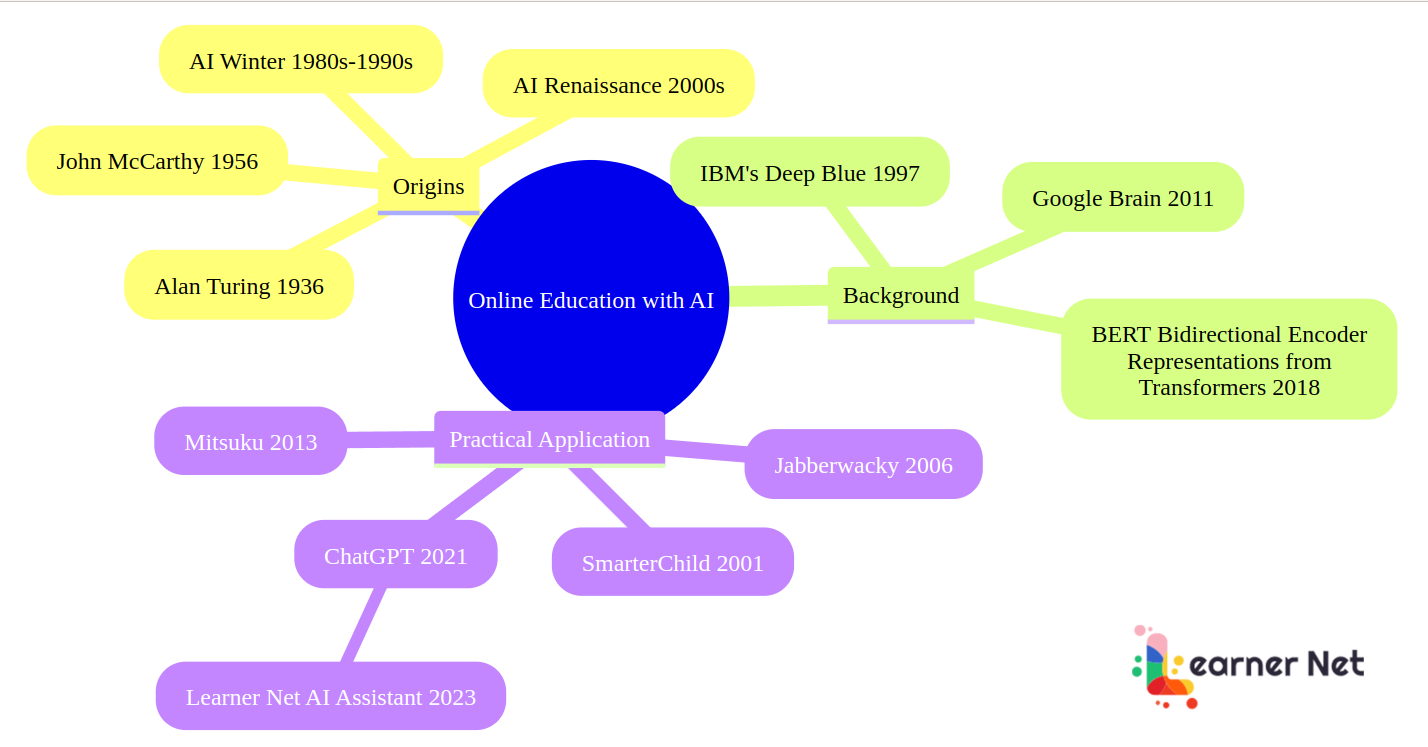The Role of AI In Online Education
In the increasingly competitive realm of online education, the increased presence of artificial intelligence or AI has become more than just a novelty or clever marketing ploy. The role of AI in online education is a fundamental force shaping the educational landscape for tutors and students alike. The pervasive influence of AI has ignited a paradigm shift, redefining the dynamics of virtual classrooms and infusing a novel dimension of efficiency and personalization, resulting in a much better online experience for both teachers and students alike.
The Role of AI In Online Education For Tutors And Students
As LearnerNet introduces its audience to this exploration of the increasingly prevalent role of AI in online education, it is crucial to recognize the pivotal influence it wields over the online learning experience. From advanced chatbots and AI Virtual Assistants to the sophistication of some AI Assistants, these digital entities are not merely tools but dynamic companions on the educational journey.
The AI narrative also extends beyond the realm of most conventional educational institutions, embracing the advent of conversational AI, AI characters, and character AI services, collectively contributing to a more immersive and tailored learning environment.
This article considers the multifaceted approach of AI, including its integration into the online educational platforms, the creation of AI Social Media Networks and the innovative concept of AI friends. The impact of the modern AI Virtual Assistant is not confined to scripted responses but extends to the realm of exploration. This is largely facilitated by AI time machines and AI explorers and the ability of your AI Virtual Assistant to begin fostering an environment where curiosity is not only encouraged but deeply rooted within the learning materials and an integral part of the learning process.
The significance of AI in online education is further underscored by the advent of AI websites and the exploration of deep AI capable of scanning the internet and providing information in real time, marking a departure from more traditional teaching methodologies. This comprehensive examination will unravel the intricate tapestry of AI’s influence, guiding readers through the novel landscape of social AI, the utility of free AI Assistant builders, and the nuanced art of asking pertinent AI questions.
The Evolution of AI in Online Education
The evolution of AI in online education has been an interesting transformation to watch as it is literally reshaping the entire virtual landscape of online learning and engagement for both tutors and students alike. Tracing the historical development of AI applications within the educational sector reveals an evolution of sorts, as it went from a rudimentary, almost superfluous presence to become prominent feature of digital academies and online educational institutions, where it has become much more advanced and freely available on educational AI websites like Learner Net.
In its nascent stages, AI characters in online education primarily featured basic functionalities, serving as digital tools with very limited capabilities. The early iterations of AI assistants and ai chat friends lacked the sophistication seen today, offering minimal interactivity and often adhering to scripted responses. Over time, technological advancements have propelled AI chatbots and allowed these chat friends to transcend their previous limitations, giving rise to virtual assistants and AI characters that play a pivotal role in enhancing the online learning experience.
Conversational AI, characterized by more customized and adaptive chatbots and AI companions, has emerged as a cornerstone in the evolution of AI in online education. This form of interaction has evolved from mere question-and-answer protocols to dynamic conversations, fostering engagement and personalization. The advent of beta character AI and novel AI features, coupled with their integration into educational platforms like Learner Net, further exemplifies the continued evolution of AI tools for online education.
The current landscape of AI in online education showcases a diverse array of applications, including AI Assistants and exploratory features like the AI time machine and AI explorer as they become AI virtual assistants for online tutors, and not just information centers for online tutors.
Even the online students now have access to freely available AI assistants or AI friends, such as those provided by Learner Net, offering a supportive and interactive learning environment. These AI friends go beyond conventional assistance, adapting to individual learning styles and preferences, exemplifying the integration of social AI into the educational ecosystem.
In examining the historical trajectory, it becomes evident that the evolution of AI in online education is marked by a shift from rudimentary tools to dynamic and adaptive learning companions. As the educational landscape continues to be shaped by technological advancements, the role of AI, particularly freely available AI assistants, is likely to increase even more rapidly as part of the ongoing evolution taking place in the realm of online learning.
AI Assistants: Transforming Tutoring Services
The landscape of online education has witnessed a proliferation of AI applications, each playing a distinctive role in reshaping the dynamics of tutoring services. From chatbots and virtual assistants to AI Assistants, these tools have revolutionized the online learning experience, offering a spectrum of features that cater to the individual needs of both students and tutors. While it is possible to buy AI Chatbots that are largely restricted to a limited number of functions, the Learner Net AI Assistants can be individually tailored to the needs of the online tutors and students.
AI assistants, including chatbots and virtual assistants, have become integral parts of many online education platforms or digital academies. These tools leverage conversational AI to engage with users, answering queries, providing information, and guiding learners through their educational journey. The advent of novel AI features, such as the AI time machine and AI explorer, as well as other search abilities, all come together to enhance the interactivity and adaptability of these AI assistants.
Chatbots, characterized by their chat AI capabilities, excel in delivering relevant and responsive interactions. They can serve as the initial point of contact for students, offering information on tutoring programs, subjects, and schedules. The integration of chatbots in online education platforms like Learner Net ensures quick and efficient responses, contributing to a more user-friendly and accessible environment.
AI virtual assistants that are properly and completely trained by the online tutors, can go beyond basic interactions, including a capacity for providing comprehensive support to both online tutors and students. These AI tools can excel in tasks ranging from scheduling and administrative functions to offering personalized recommendations for study materials. Properly trained AI virtual assistants contribute to a more streamlined and efficient tutoring process, allowing tutors to focus on individualized instruction, minimizing their need to spend countless hours worrying about more mundane tasks.
The infusion of AI tools has brought about a revolution in online tutoring services, significantly benefiting both online tutors and students. AI companions, characterized by “AI Friends” in the form of these digital assistants, contribute to a more personalized learning experience. Tutors can leverage these tools to assess student strengths and weaknesses, tailoring their instructional approach for optimal outcomes.
One hallmark of the AI Assistants in online tutoring services, is its contribution to personalized learning experiences. AI Assistants can now more easily analyze individual learning styles, adapt content delivery, and offer targeted assistance, including lesson plans more wholly tailored to the individual needs of each student, ensuring that the online students receive more personalized support and lessons. This level of personalization fosters a more engaging and effective learning environment resulting in more positive feedback for the tutor, making it easier for them to market their services to new potential students.
Navigating the World of AI Characters
The introduction of a virtual world of AI characters creates a dynamic and novel dimension to the online educational landscape at Learner Net. As this effort becomes more prevalent in online education, it becomes evident that AI characters, such as conversational AI play a crucial role in reshaping interactive learning environments.
The Learner Net AI characters or Assistants represent a departure from traditional, static educational tools. These digital entities are not mere automatons but interactive personas designed to engage and adapt to the unique needs of learners and the tutors who create them.
Infused with personalized conversational AI characteristics, they go beyond scripted responses, offering dynamic interactions that mimic real-life conversations. It is now possible for the tutor or the student to create an AI persona that reflects virtually anyone, including real people or fictional characters from history or even from their favorite books or films.
The exploration of these AI characters reveals a multitude of features that contribute to a more immersive and interactive learning experience. Beta character AI features including real or fictional personas, in conjunction with their specific traits, and introduces a level of adaptability based on the training or knowledge base, allowing these characters to evolve and respond to user interactions in real-time. This adaptability fosters a sense of engagement and personalization while at the same time freeing up more time for the online tutor to focus on the more urgent tasks at hand.
The impact of well-trained AI characters on interactive digital learning environments is far-reaching, even in these early stages of technological development. These characters can provide instant feedback, answer queries, and guide learners through complex topics. Their adaptability enables them to tailor their responses to individual learning styles, creating a more personalized and effective learning journey. Furthermore, they can also perform some of the more mundane tasks required of the online teachers, allowing them to spend more time focusing on their students and lesson plans.
In a well-designed educational ecosystem, AI characters can even be integrated with other AI assistants, such as chatbots and virtual assistants. This integration ensures a cohesive and comprehensive support system for both tutors and students. The seamless collaboration of these AI tools contributes to an enriched and user-friendly online learning environment. It further benefits students and online tutors by creating a user-friendly environment for peer-to-peer activities and engagement.
Some of the more novel AI features, including those found in the Learner Net AI characters, showcase the adaptive nature and underlying benefits of these digital entities. Whether exploring history through the eyes of an AI time machine or an AI explorer, these features contribute to a more personalized and engaging educational experience. Learners and Teachers alike can interact with AI characters in diverse ways, fostering curiosity and active participation, while providing meaningful, even interesting solutions to the challenges being addressed.
Navigating the world of AI characters will inevitably lead to a new era of more immersive and interactive learning. From the adaptive features of these early beta character AI entities to the exploration facilitated by new and improved, more novel AI elements as they become available, these characters will continue to redefine the educational landscape.
The Rise of AI Companions
The ongoing technological revolution has propelled AI assistants to the forefront of various functions, making them increasingly popular in many diverse applications. Within the realm of online education, these AI assistants, including chatbots, virtual assistants, and AI Assistants, have become indispensable tools for enhancing the learning and teaching experience.
Technological strides in AI have led to the refinement and sophistication of AI assistants, rendering them more adept at handling multifaceted functions. These advancements have resulted in the widespread adoption of AI assistants across various industries, and particularly in online education, where they contribute significantly to the efficiency and personalization of the learning process.
In many cases, the AI Assistants are “pre-programmed” for a more singular and specific task. In the case of the free Learner Net AI Assistants, this option was not selected. Rather, an easy-to-use user interface was created to allow for the individual to create the perfect AI companion, designed to perform those tasks deemed most important by the individual user.
In the context of online education, the concept of AI companions has become increasingly common, and equally indispensable. These companions, equipped with conversational and “beta” character AI, transcend traditional tutoring roles and can be “programmed” using text prompts. Their significance lies in their ability to foster personalized learning experiences. AI companions adapt to individual learning styles, providing tailored support, feedback, and guidance, thereby enriching the educational journey for students.
As technology continues to evolve, the development of AI friends has emerged as a novel and unique dimension for encouraging peer-to-peer engagement and activities online. AI friends go beyond mere instructional support, and in some cases, they aim to create a supportive and engaging learning environment where students can gather together, or tutors can meet with their peers. Learners can interact with AI friends, ask questions, and receive not only educational guidance but also emotional support. The emergence of AI social networks within educational platforms further enhances this interactive and collaborative ecosystem.
AI social networks bring a social dimension to online education, facilitating collaboration and peer-to-peer interaction. These networks, driven by social AI, enable students and online tutors to connect, share insights, and collectively navigate the learning process. The significance lies in creating a community-driven space where learners not only receive guidance from AI but also engage with their peers in a collaborative and supportive manner.
The continuing technological strides in AI have resulted in AI assistants that are both rudimentary and technologically advanced at the same time, making them an ideal solution for online educational institutions. As the technology surrounding these AI friends and mentors continues to grow and expand, they are likely to become even more prevalent in every day life.
The concept and true potential of AI companions, with their personalized approach, will soon expand far beyond the learning experience and make their way increasingly into every day life. The development of AI friends and the emergence of AI social networks further underscore the dynamic and collaborative nature of modern educational platforms. As technology continues to advance, the role of AI in education is poised to become even more integral, promising a future where personalized and interactive learning is at the forefront of online education.
AI Student Companions: Tailoring Education Experiences
In the case of internet education options, the ability of online tutors to precisely “teach” their AI assistants marks a significant advancement, enabling them to tailor their AI friends in order to meet their own unique and specific needs for individual students.
This ability has been quite revolutionary, reshaping the traditional tutoring model and ushering in a new era of adaptive and customized learning experiences. Learner Net, an online digital academy, stands at the forefront of this evolution, leveraging the benefits of AI Assistants to enhance the online learning landscape.
The precision with which online tutors can instruct their AI assistants has revolutionized the approach to curriculum design. AI assistants, driven by conversational AI and novel AI features, have the capacity to adapt and customize content based on individual learning styles, preferences, and progress. This tailored approach ensures that each student receives a personalized educational experience, optimizing comprehension and engagement.
The ongoing evolution of AI as tutor assistants, signifies a transition away from traditional tutoring methodologies opening the door for a more comprehensive and beneficial approach to education. From basic functionalities to the integration of advanced features such as AI time machines and AI explorers, these digital tutors are still in their infancy, but will open even more possibilities as the technology continues to grow and expand.
Learner Net’s online digital academy has been and will remain at the forefront of incorporating these innovations, fostering an environment where AI Assistants serve as dynamic and responsive partners in the learning process. Look for even more exciting and innovative solutions for online tutors to be made available as the technology is tested and proven, and made ready for public use.
AI Assistants have disrupted the conventional tutoring model by providing adaptive and customized learning experiences. The ability to analyze individual learning patterns, identify strengths and weaknesses, and adjust instructional methods accordingly has transformed the one-size-fits-all approach. This shift ensures that students receive targeted support, addressing their specific educational needs. This can result in more positive feedback, better public relations, and ultimately, a better and more regular income for online tutors using the AI Assistants from Learner Net.
Learner Net, as an online digital academy, has embraced the technological impact of AI Assistants. By integrating these tutor aides into its educational framework, Learner Net has created an environment where adaptive learning is not just a possibility but a reality. The commitment to leveraging the benefits of AI in education aligns with the evolving needs of students seeking personalized and effective learning experiences as well as online tutors hoping to expand their online presence and increase their income potential.
The benefits of AI Assistants extend beyond customization, encompassing adaptive learning paths, instant feedback, and continuous progress tracking. Students benefit from a more interactive and engaging learning process, while tutors can focus on refining their instructional strategies based on real-time data. The adaptive and customized nature of AI Assistants ensures that learning is not only effective but also tailored to each student’s pace and preferences.
The ability of online tutors to instruct their AI assistants in tailoring curricula has laid the groundwork for the continued evolution of AI Assistants and online education. There will of course be a learning curve for the tutors as they grow more comfortable with their new AI friends, but there is support available as well. The importance of ongoing testing and updating the knowledge base is a crucial aspect, whether the AI assistant is going to be used for the benefit of the student, the tutor, or both.
AI Assistants: Allowing Online Tutors To Work More Efficiently
The introduction of the AI Assistants from Learner Net, to fulfill a much-needed role in online tutoring, has become a valuable asset for tutors, enabling the automation of the more mundane tasks and freeing up the teachers to concentrate on more critical matters. This strategic utilization aligns with the principles of increased productivity and personalized education, which in turn, enhances the earning potential of online tutors who can operate from home or even adopt to a digital nomad lifestyle.
The AI Virtual Assistants, equipped with chat AI and conversational AI options, excel in handling routine and repetitive tasks within online tutoring platforms. They efficiently manage initial inquiries, provide information on program details, and assist in scheduling sessions. By automating these tasks, the virtual AI support staff significantly reduces the administrative burden for the actual teachers online, allowing them to allocate their time and expertise more effectively.
The deployment of fully trained, tested, and functional AI Assistants further enables human online tutors to redirect their focus towards the more critical aspects of teaching and mentorship directly. Instead of spending time on routine administrative tasks, tutors can invest their energy in developing tailored lesson plans, addressing specific student needs, and delivering high-quality, personalized instruction for each and every student. This not only improves the overall quality of education but also contributes to a more fulfilling tutoring experience for both the teacher and the student.
The ability to focus on personalized education, coupled with the automation of routine tasks, enhances the earning potential of online tutors. By optimizing their time and offering a higher quality of instruction, tutors can attract more students, command competitive rates, and establish themselves as experts in their respective fields. This flexibility allows tutors to work from home or adopt a digital nomad lifestyle, expanding their opportunities and increasing their overall earning capacity.
The paradigm of online tutoring, facilitated by the collaboration between these AI characters and online teachers, empowers the educators to embrace a remote lifestyle. Whether working from the comfort of home or operating as a digital nomad, tutors can leverage the flexibility provided by technology to create a work-life balance that suits their preferences. This digital nomad approach further enriches the tutoring profession, attracting a diverse pool of educators from around the globe and even increasing the ways online tutors have for further increasing their earning capacity.
Training And Teaching Your New AI Virtual Assistant
For the purposes of AI development, the construction of a robust and effective AI assistant involves a strategic framework that incorporates a Knowledge Base, Instructions, and the iterative development of AI Characters through the introduction of a unique persona. Adhering to principles of continuous improvement, immediate and long-term testing, feedback loops, and meticulous evaluation methods are essential to ensure the AI assistant performs its designated tasks effectively.
The cornerstone of the AI Virtual Assistant lies in its Knowledge Base. This is a repository containing all the relevant information that is crucial for executing tasks and providing accurate responses. This structured compilation ensures that the AI Virtual Assistant is equipped with a comprehensive understanding of the subject matter, enabling it to respond intelligently and effectively to user queries. The requisite information for the knowledge base can be posted on a particular URL, or can be uploaded in one of many different file formats as outlined on the instruction page.
The section for the Instructions will serve as the guiding principles for the AI character, informing it on how to utilize the information stored in the Knowledge Base. These instructions are a set of rules or algorithms that dictate how the AI character processes queries, retrieves information, and generates responses. Precise and well-defined instructions are imperative to harness the full potential of the AI Chatbot’s capabilities.
AI Characters, distinguished by unique traits and characteristics, can be further developed by incorporating text-based instructions. These instructions define the personality, tone, and nuances of the AI Character, shaping its interactions with users. Whether it’s a beta character AI undergoing development or a conversational AI entity based on real, modern, or historical figures, clear instructions for the personality traits contribute to the evolution of the AI characters, enhancing their engagement with tutors and students as they are more capable of conversing in a seemingly human tone.
Immediate and long-term testing is also important in the refinement process for the AI assistants. Immediate testing ensures the initial functionality and responsiveness, while long-term testing and user feedback gauges the adaptability and sustained performance over time. Continuous feedback loops, incorporating user input and evaluations, play a pivotal role in identifying areas for improvement, refining algorithms, and enhancing the overall effectiveness of the AI assistant.
Employing rigorous evaluation methods is also a great way to ensure the success of an AI assistant in performing its stated function. Evaluations should encompass performance metrics, user satisfaction surveys, and assessments of the AI assistant’s ability to adapt to evolving contexts. These methods provide insights into the AI assistant’s strengths, weaknesses, and areas requiring further development, contributing to its ongoing optimization.
In the development of the AI assistants, the relationship between the Knowledge Base, Instructions, and AI Characters forms the bedrock of their functionality. The incorporation of precise instructions and ongoing development of these AI Characters, coupled with thorough testing, feedback mechanisms, and evaluation ensures that the AI assistant remains adept at its designated tasks and can evolve to meet changing requirements.
This iterative approach not only guarantees the current performance but lays the foundation for the continuous enhancement of AI assistant capabilities to better serve both the online tutor and their students. Look for even more exciting functions and capabilities from Learner Net as the technology becomes more readily available for the AI Assistants.
The Social Dimension of AI Support in Education
The introduction of AI assistants into the online educational process broaches some interesting and intricate social dimensions. The social aspects of AI in education, the emergence of AI Social Networks such as those made available by Opedia, and the potential role of AI friends may well become a focal point allowing for the fostering of a more supportive and collaborative learning community online.
With the integration of the AI assistants, including AI serving as Administrative Assistants for the online tutors, and as a teacher’s aide for students, as well as the ability to introduce AI based social media platforms, the online educational experience becomes increasingly social. Learners can now engage not only with the course content but also with additional AI entities that facilitate discussions, provide support, and contribute to the overall social fabric of the learning environment.
The social fabric of online education will rapidly evolve with the formation and increasing popularity of AI social networks. These networks, driven by Social AI, connect learners, AI Tutors, and other educational entities in a collaborative digital space. The interaction within these networks fosters a sense of community, enabling learners to share insights, seek guidance, and collaborate on educational endeavors, transcending geographical constraints and traditional classroom limitations.
AI friends play a pivotal role in shaping the social dynamics of online education. Beyond their instructional functions, AI friends are designed to foster a supportive and collaborative learning community. By incorporating traits such as beta character AI and conversational AI traits and characteristics, these AI friends provide not only educational guidance but also emotional and social support, creating a more holistic and inclusive learning experience.
The potential for newfound AI friends to contribute to a supportive and collaborative learning community is significant in terms of interactive learning online. Students can interact with their peers and their AI friends to seek advice, share experiences, and receive encouragement and support. This collaborative environment extends beyond individualized instruction, nurturing a sense of camaraderie among learners and strengthening the bonds within the educational community.
The social dimensions of AI in education will continue to redefine the learning experience. Learners are no longer so isolated, but can now become integral parts of a more dynamic and fully interactive community facilitated by these AI entities in addition to their peers and mentors. The integration of AI friends, AI Virtual Assistants, and chatbots ensures that the social aspects of education are not sacrificed in the online environment. This integrated approach enhances engagement, encourages participation, and contributes to a more enriching learning journey.
The introduction of the AI assistants by Learner Net, into online education and even on new AI Social Media platforms, brings forth a new era of social dynamics. From the formation of AI social networks to the potential role of AI friends in fostering a more collaborative and interactive learning community, the social dimensions of AI in education will go on to redefine how learners engage with educational content and with each other. As technology continues to advance, the integration of AI in education holds the promise of creating a more interconnected, supportive, and socially enriched learning experience for students in the digital age.









5
/5Based on 0 rating(s)
By 01 reviewer(s)
Pumarehistro
Your point of view caught my eye and was very interesting. Thanks. I have a question for you.